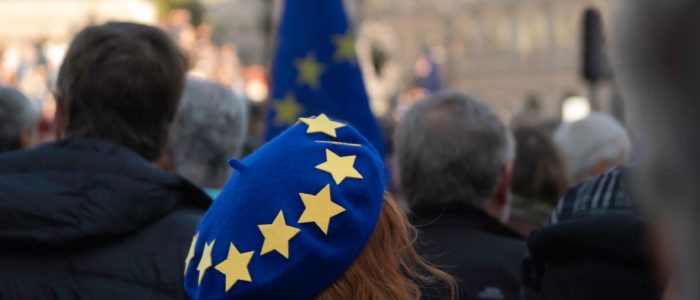Published
NGO Lobbying – How to Ensure Accountability and Transparency at the EU Level
By: Matthias Bauer João Carvalho
Subjects: EU Single Market European Union

On January 22, the Wilfried Martens Centre for European Studies and ECIPE hosted a seminar on the accountability and transparency of the non-governmental organisations (NGOs) funded by the EU.
The event started with Matthias Bauer (ECIPE) presenting his latest report on “NGO Lobbying on Trade and Investment: Accountability and Transparency at the EU level”. Next, Anna-Michelle Asimakopoulou (MEP from Greece and vice-chair of the Committee on International Trade) and Beat Späth (Agricultural Biotech Director at EuropaBio) commented on the studies’ reform proposals and the political challenges ahead. Roland Freudenstein, Policy Director at the Wilfried Martens Centre for European Studies, moderated the event.
According to the report, the European Commission has long served as a rich source of money for NGOs. However, several studies – two from the European Parliament and one from the European Court of Auditors – recently criticised that the European Commission lacks proper mechanisms to enforce the financial transparency of the organisations and their accountability concerning the conditions attached to the financial grants. Dr Bauer confirmed these concerns: “The European Commission provides substantial funding to a handful of NGOs only, resulting in a centralist, top-down and not very democratic civil society in Brussels. At the same time, publicly available information on grant levels, NGO recipients and NGOs’ subcontractors for lobbying work is generally scarce. As outlined by several studies in the past, the information provided by the European Commission does not allow for a data-driven analysis of grants, grant-funding procedures and conditionalities such as Terms of References.” Dr Bauer also pointed to influential Member State governments, e.g. Germany’s Ministries for Development Aid and the Environment, which provide hundreds of millions of euros annually to NGOs which continue to participate and still support concerted campaigns against EU trade agreements. He also added that this “raises serious concerns about democratic representation” and, referring to smaller EU Member States, “who really has a say in Brussels.”
For her part, Anna-Michelle Asimakopoulou noted that “while more than €11 billion have been committed by the European Commission for implementation by NGOs from 2014 to 2017, recent reports indicate that there are serious problems with the EU’s current transparency and accountability mechanisms for EU-funded NGOs as well as with the respect of central EU values.” Ms Asimakopoulou referred to her personal experience in the past working for an NGO. “Proper and efficient funding, management and reporting mechanisms are being implemented in EU programmes such as H2020, so there is no need to reinvent the wheel. We need to show determination to ensure democratic control of public funding granted to NGOs”, she added.
The report also raised concerns whether the EU should be financing NGOs that openly advocate against its core values. In the case of trade policy, influential EU-funded NGOs have organized anti-TTIP and anti-CETA campaigns and called the EU’s trade and investment policy a threat to democracy and a rule of law. Many NGOs that received EU and Member State funding suggested that EU trade policy contributed to growing inequalities, social dislocation and environmental disasters. These campaigns were undermining one of the EU fundamental principles by using disinformation, populist rhetoric and overly simplified messages. Noting that the discussion of values is sensitive to political views, Dr Bauer stressed that the NGOs financed by the EU taxpayers should not contradict the EU’s basic values, which are inscribed in its Treaties.
However, the European trade policy is not the only subject targeted by publicly-funded NGOs. Beat Späth referred to the field of biotechnology, which “is clouded by misinformation”. Even though it is considered a key enabling technology, Mr Späth added that “the EU is lagging behind all other continents in this field, and depending on imported products such as genetically-modified crops”. In addition, he noted that “when applied in agriculture, the EU has expelled and killed most R&D in biotechnology.” Mr Späth also argued that “science enables progress and is a key to achieve the sustainability targets. Should public authorities provide support to organisations that reject scientific knowledge, such as the anti-vaccination movement? Because that is what some of them do on biotech.” Mr Späth added that a red line should be that no recipient of taxpayers money could use disinformation in their campaigns.
The panel agreed on the implementation of stricter conditionalities for receiving public funds and, where applicable, represented values such as political ideologies should be taken into account. A strong civil society is very important and NGOs serve as a component of functioning civil societies. “Democracy requires all voices to be heard and this is one of the fundamental values of the EU. Europe and its institutions shall, however, serve its values and ensure that the activities of EU funded NGOs do not fundamentally contradict the EU’s basic principles”, concluded Ms Asimakopoulou.
The panellists declared they were open for an honest discussion about the purposes and limitations of public funding. “The question is what are the rules governing public financing of NGOs. The Martens Centre & ECIPE study is a contribution to a debate. We need to improve transparency and accountability and ensure that the EU core values are followed thoroughly”, summarised Roland Freudenstein. “The red lines remain to be discussed in a political process with the elected representatives of the people”.